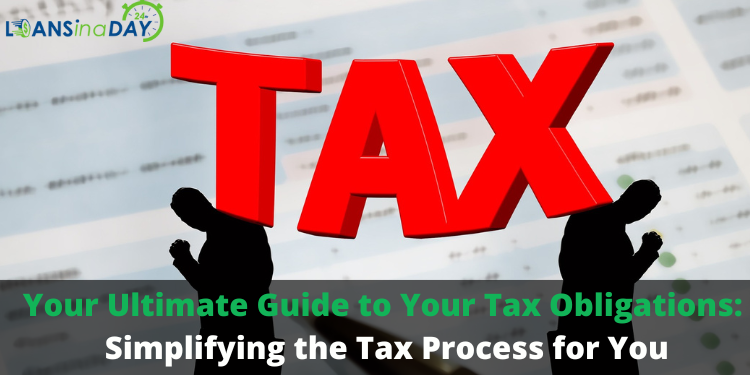Taxes can be daunting for many Americans. With a complex tax code and various rules and regulations to follow, it's easy to feel overwhelmed. However, understanding and managing your tax obligations is crucial to avoid penalties and fines from the Internal Revenue Service (IRS). In this blog, we'll simplify the tax process for you and provide some financial tips to help you manage your obligations.
Types of Taxes in the US
There are several types of taxes that individuals and businesses may have to pay in the US. Here are some of the most common types of taxes:
- Income Tax: This is the tax on your earnings from employment, investments, or other sources of income. The tax rate varies based on your income level and filing status.
- Social Security and Medicare Taxes: These taxes are deducted from your paycheck to fund the Social Security and Medicare programs. The combined rate for these taxes is 7.65% for employees and 15.3% for self-employed individuals.
- Sales Tax: This is a tax on goods and services purchased by consumers. The tax rate varies by state and locality.
- Property Tax: This is a tax on real estate, including land and buildings. The tax rate varies by state and locality.
- Estate Tax: This is a tax on the transfer of assets after someone passes away. The tax applies to estates with a value above a certain threshold, which varies by state.
How to Determine Your Tax Obligations?
Before you can file your taxes, you need to determine your tax obligations. Here are some key steps to follow:
- Understanding Your Tax Status: You need to determine whether you are a resident or non-resident for tax purposes. This status will determine your tax obligations and filing requirements.
- Calculating Taxable Income: You need to calculate your taxable income by subtracting any deductions and credits from your total income.
- Deductions and Credits: You can reduce your taxable income by taking deductions and credits. Common deductions include charitable contributions, mortgage interest, and student loan interest. Common credits include the Earned Income Tax Credit and the Child Tax Credit.
Filing Taxes in the US
Once you have determined your tax obligations, you need to file your taxes. Here are some important things to keep in mind:
- Tax Filing Deadlines: The deadline to file your federal income tax return is April 15th, unless you receive an extension. State tax deadlines vary by state.
- How to File Taxes: You can file your taxes online or by mail. Online filing is faster and more convenient, and you may even qualify for free online filing through the IRS Free File program.
- Common Tax Forms: The most common tax forms are 1040, W-2, and 1099. 1040 is the main tax form used to report your income and deductions.
Paying Taxes in the US
If you owe taxes, you need to pay them by the deadline to avoid penalties and interest. Here are some payment options available to you:
- Credit Card: You can pay your taxes with a credit card, but you will be charged a convenience fee.
- Cheque: You can mail a cheque to the IRS or pay in person at a payment location.
- Direct Deposit: You can have your refund deposited directly into your bank account and even your payment withdrawn from your account.
- Installment Plans: If you can't pay your taxes in full, you may be able to set up an installment payment plan with the IRS.
However, if you don't pay your taxes on time, you may face penalties and interest charges, and the IRS.
Hiring a Tax Professional If you're not comfortable with preparing your taxes or have a complicated tax situation, you should consider hiring a tax professional or CPA.
Here are some reasons why you should consider hiring a tax professional:
- Expertise: Tax professionals have the expertise to navigate the complex tax code and find deductions and credits that you may have missed.
- Saves Time: Hiring a tax professional can save you time and stress by taking care of the entire tax process for you.
- Avoid Errors: Tax professionals are less likely to make mistakes on your tax return, reducing the risk of an IRS audit or unnecessary fines.
Finding a Reputable Tax Professional
When hiring a tax professional, it's important to find someone who is reputable and trustworthy. Here are some tips for finding a reputable tax professional:
- Credentials: Look for a tax professional with credentials such as a Certified Public Accountant (CPA), Enrolled Agent (EA), or Tax Attorney.
- Experience: Look for a tax professional with experience in handling tax situations similar to yours.
- Referrals: Ask friends, family, or colleagues for referrals to reputable tax professionals they have worked with.
Conclusion
Managing your US tax obligations doesn't have to be stressful. By understanding the types of taxes you may have to pay, determining your tax obligations, filing your taxes correctly, paying your taxes on time, and possibly hiring a tax professional, you can simplify the process and avoid penalties and fines from the IRS. Remember to take advantage of deductions and credits and always keep accurate records of your income and expenses.
Manage Your Tax Obligations with LoansinaDay this Year
If you're in need of financial assistance to help pay your taxes or any other expenses, consider LoansinaDay.
With a wide network of direct lenders, we offer online loans, including payday loans online, to help you manage unexpected expenses or bridge the gap between paychecks.
With quick and easy approval processes, we can provide you with the financial support you need in a timely manner. We are at your service throughout the year. Apply now to handle your tax obligations!
